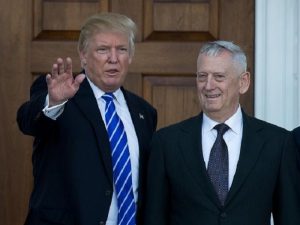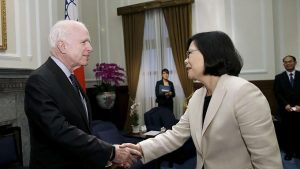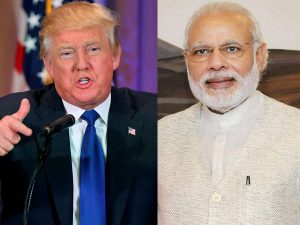 Barely a week before Donald Trump is sworn in as president of the US, there are reassuring signals that while the India-US relations will be scaled up, the incoming administration will be tough on China, creating a new balancing game in the crucial Asia-Pacific region.
Barely a week before Donald Trump is sworn in as president of the US, there are reassuring signals that while the India-US relations will be scaled up, the incoming administration will be tough on China, creating a new balancing game in the crucial Asia-Pacific region.
Ahead of his Senate confirmation hearing, Gen (retd) James Mattis, President-elect Donald Trump’s nominee for Defence Secretary, has identified building stronger ties with India as of “utmost importance.” Gen. Mattis underlined that if confirmed, he would identify areas where India and the US could further bolster their defence ties. It’s a clear signal from the incoming administration that the transformation of the India-US relationship accomplished during the Obama administration, which culminated in the elevation of India as US’ Major Defence Partner, will not only continue apace, but will scale new frontiers in months to come.
“The US policy should continue to pursue a long-term strategic relationship with India based in convergence of our interests and our shared democratic values,” Mattis told legislators in a written response to the Senate Armed Services Committee ahead of his confirmation hearing. “If confirmed, I would assess what particular areas in the bilateral security relationship I should focus, and what steps can be taken to bolster the overall defense relationship,” said Mattis, a former commander of US Central Command.
Underscoring that India is the world’s largest democracy and “our relationship with it is of utmost importance,” Mattis added: “In my view, and particularly on security and defense issues, the US-India relationship has been strengthened in recent years.”
If Mattis was upbeat on India, he was assertive and upfront on confronting what he called “inappropriate” Chinese behaviour while forging stronger partnerships with like-minded countries like India in the region.
“I believe we must seek to engage and collaborate with China where possible, but also be prepared to confront inappropriate behaviour if China chooses to act contrary to our interests,” Mattis, better known by his nickname “Mad Dog,” said.
“China’s behaviour has led countries in the region to look for stronger US leadership,” he said. “We must continue to defend our interests there — interests that include upholding international legal rights to freedom of navigation and overflight,” he said.
Containment geopolitics
 Mattis’ remarks should allay apprehensions of those who felt that the Trump administration will withdraw from an activist role in security of the Asia-Pacific region, leaving the field wide open for China, the region’s powerhouse, to set the agenda. President-elect Trump has already rattled Beijing by his controversial telephone call to Taiwan’s President Tsai Ing-we, indicating that it won’t be business as usual with China unless the latter is more sensitive and accommodative of the US concerns. If the US were to revise its One China policy, the US-China relations are set to hurtle downhill.
Mattis’ remarks should allay apprehensions of those who felt that the Trump administration will withdraw from an activist role in security of the Asia-Pacific region, leaving the field wide open for China, the region’s powerhouse, to set the agenda. President-elect Trump has already rattled Beijing by his controversial telephone call to Taiwan’s President Tsai Ing-we, indicating that it won’t be business as usual with China unless the latter is more sensitive and accommodative of the US concerns. If the US were to revise its One China policy, the US-China relations are set to hurtle downhill.
 What it all adds up to is that contrary to speculation in some sections, the Trump administration will broadly pursue a recalibrated balancing strategy in Asia-Pacific by continuing to bolster ties with India and Japan while relating to China in a tough no-nonsense manner. These remarks are sure to be resented by the powers-that-be in Beijing which has often accused Washington of following an insidious containment strategy, in league with New Delhi and Tokyo.
What it all adds up to is that contrary to speculation in some sections, the Trump administration will broadly pursue a recalibrated balancing strategy in Asia-Pacific by continuing to bolster ties with India and Japan while relating to China in a tough no-nonsense manner. These remarks are sure to be resented by the powers-that-be in Beijing which has often accused Washington of following an insidious containment strategy, in league with New Delhi and Tokyo.
Author Profile

- Manish Chand is Founder and Editor-in-Chief of India Writes Network (www.indiawrites.org) and India and World, a pioneering magazine focused on international affairs. He is CEO, Centre for Global India Insights, an India-based think tank focused on global affairs.
Latest entries
 India and the WorldFebruary 17, 2026South-by-South: Focus on people-centric solutions at India AI summit
India and the WorldFebruary 17, 2026South-by-South: Focus on people-centric solutions at India AI summit India and the WorldFebruary 7, 2026Modi hails interim India-US trade deal, Goyal says no concessions made on agriculture
India and the WorldFebruary 7, 2026Modi hails interim India-US trade deal, Goyal says no concessions made on agriculture India and the WorldFebruary 2, 2026Trump announces trade deal with India, Modi ‘delighted’
India and the WorldFebruary 2, 2026Trump announces trade deal with India, Modi ‘delighted’ India and the WorldJanuary 31, 2026Palestinian minister bats for mediatory role for India in ending Gaza conflict
India and the WorldJanuary 31, 2026Palestinian minister bats for mediatory role for India in ending Gaza conflict







